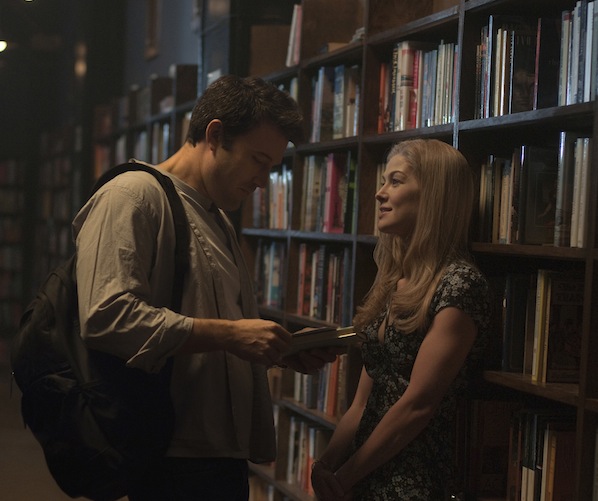Fuse Film Review: “Gone Girl” — A World of Women to Worry About
Director David Fincher does a good job at making our skin crawl while we chuckle at the audacity of the goings-ons in Gone Girl.
Gone Girl, directed by David Fincher. Screening at Kendall Square and cinemas around New England
Boston Area Film Schedules — What is playing today, Where and When
By Tim Jackson
Who knows? Might the book or movie of Gone Girl plant a seed of uxoricide or perhaps mariticide in your brain? You are probably familiar with the novel’s storyline, which focuses on a man who is all but convicted by the media and public opinion for murdering and then salting away the body of his wife. In David Fincher’s film adaptation (screenplay by Gillian Flynn, who is also the author of the spooky and disturbing novel), the plot is exploited to satirize middle class marriage and woe. Ben Affleck is perfectly cast as Nick Dunne, the much-too cool husband with the lying cleft chin; the icily beautiful Rosamund Pike handles the role of Amy Elliott-Dunne, Nick’s missing wife, well.
Fincher does a good job at making our skin crawl while we chuckle at the audacity of the goings-on. Think of the hideously displayed bodies in his earlier film Seven, with it’s ‘Oh my God, you didn’t do that’ ending. He made smooth work of police procedures in Zodiak and The Girl with the Dragon Tattoo. In the latter film he brought a surprisingly fresh approach to what had been an excellent Danish film version of the source novel. Fincher has a way of bringing energy to a film even when it is as dialogue heavy as The Social Network. His savvy pizazz serves Flynn’s plot and script superbly. Her wry, nasty dialogue serves what is, in truth, a droll murder mystery: it is a dark comedy that slaps around middle class values, group-think, and the hypocrisies and compromises of bourgeois morality.
Contemporary novels often don’t translate well to film, but Flynn has restructured her narrative into a well-crafted piece of Hollywood suspense. The twists are the same as in the book, but here the satire and tension escalate as the film builds and builds. Much of the dialogue is lifted verbatim from the novel, though it is sprinkled around into unexpected places. Many scenes play exactly as readers might imagine, but they are amped up by Fincher’s probing camera and zippy editing. The author’s viciously bitter look at how marriage works today remains no less biting in the film, but the novel’s conclusion felt contrived. Fincher actually improves on the ending by ratcheting up the tension. As the situation becomes nastier it also becomes funnier. It’s a great blend that spins the conclusion in ways that we don’t expect.
Flynn’s screenplay is enhanced by smart casting choices. Affleck was admired early in his career as the sharp Boston upstart, then criticized for his ‘Gigli‘ phase, redeemed with Argo and The Town, and is now generating a skeptical buzz on social media for his Batman casting. This makes him a perfect choice for the story’s too handsome husband of questionable integrity. Neil Patrick Harris is suitably bratty as Amy’s infatuated ex-lover; Tyler Perry commanding as Nick’s lawyer. Carrie Coon is Nick’s faithful sister, Margo, the kind of serious smart and kind character that often goes to Janeane Garofalo. Coon nails it. Equally surprising is Kim Dickens as Detective Rhonda Boney; the actress finds the perfect balance between being professionally skeptical and empathetic.
Affleck’s mouth-watering and voracious lover (Emily Ratajkowski from iCarly) is certainly the type who is going to be a major problem. As the town grows skeptical about Nick’s innocence, he’s lambasted by a pregnant neighbor Noelle Hawthorne (Casey Wilson), raked over the coals by Ellen Abbott (Missi Pyle) in her cable show, which focuses on stories of women who are abused, then he is redeemed Sharon Schieber, a tartly professional Barbara Walters type (Sela Ward). Given all of these females, as well as Pike’s hard-edged Amy, Nick has a world of women to worry about.
The problem for both the book and the film is that they have to stuff a lot of contrivances into a story that begs to be driven by believable characters. Neither pulls that trick off off perfectly. But by surrounding Nick with strong and uncompromising female characters, the movie becomes a delightful combination of farce and thriller that looks at how relentless feminine forces can pulverize a man. And Affleck, to his credit, holds onto his staunch posture of manliness for dear life. Flynn’s savage (and at times somewhat earnest) vision was aimed squarely at the hypocrisies of men, women, and marriage. Fincher revs up Gone Girl into a kind of farcical horror story.
Men beware – Nick will learn his lesson – and it’s not what you expect.
Tim Jackson is an assistant professor at the New England Institute of Art in the Digital Film and Video Department. His music career in Boston began in the 1970s and includes some 20 groups, many recordings, national and international tours, and contributions to film soundtracks. He studied theater and English as an undergraduate and has also has worked helter skelter as an actor and member of SAG and AFTRA since the 1980s. He has directed a trio of documentaries: Chaos and Order: Making American Theater about the American Repertory Theater, and Radical Jesters, which profiles the practices of 11 interventionist artists and agit-prop performance groups. His third documentary, When Things Go Wrong, about the Boston singer/songwriter Robin Lane, with whom he has worked for 30 years, has just been completed. He is a member of the Boston Society of Film Critics. You can read more of his work on his blog.

